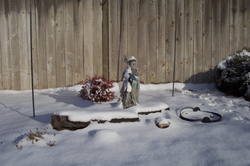What's New
Dharma Thoughts ~
Mindfulness of the Body...
Mindfulness of the body begins when we get up in the morning, washing our face, getting dressed, etc. Then we carry that mindfulness with us as we light the candle and incense in the zendo for the morning sitting. After meditation, we are mindful of the body as we chant. Then we bring it with us as we leave the zendo and begin preparing breakfast. This continues as we move purposefully throughout the day.
During the sittings of zazenkai, we work with awareness of our bodies as they breathe, awareness of our backs, legs, etc., awareness as we bow in gratitude to the timekeeper's bell, as we stand for walking meditation, etc.
Often, we hurry from one activity to another, almost without thinking, unmindfully, so the practice of being mindful of our movements at different points during the day can ground us in the present moment.
Anapanasati Sutra (#118).
Here a bhikkhu, gone to the forest or to the root of a tree or to an empty hut, sits down; having folded his legs crosswise, set his body erect, and established mindfulness in front of him, ever mindful, he breathes in, mindful he breathes out. (Mindfulness of Brfeathing, Sutra #118, v. 17)
The Buddha was talking about paying attention to what is going on in the body in this moment, rather than thinking about something that happened yesterday or might happen tomorrow. The practice of Zen Buddhism ties us to our experience in the present moment, right here, right now.
It's interesting to observe the mind doing everything it can to avoid paying attention to the present moment. It's like a fish fighting the hook, whipping about in an attempt to get free.
When we sit, the mind fights to avoid seeing what is, as it seems to fear the present moment. Instead, it slides to the past, imagines the future or comes up with itches, aches and pains or something we absolutely must do right now. What is there about the present moment that is so frightening that the mind struggles so to avoid it?
The Buddha gives us an answer in Sutra #62, v.3, The Greater Discourse of Advice to Rahula:
This is not mine, this I am not, this is not my self.
The past is not ours. The future is not ours. They only exist in our imaginations. Even the present is not ours, but we, at least, can observe it and be present to what is happening right now, which can teach us about ourselves.
Each month those who of us sit together during zazenkai have the opportunity to step aside from our daily lives and responsibilities for a while and take time to practice more intensely and then take that month's particular practice with us.
Please try and set aside several times a day to move purposefully through an activity. It only takes a few seconds to pay attention to what you are doing and then move on.
Jikei
At the time of his death, the Buddha said, "After my death, those who have not yet understood the Dharma will surely fall into states of suffering."
Ksitigarbha Bodhisattva replied, "Even if their good deeds are as little as a hair, a drop of water, a mote of dust or a bit of down, I shall gradually help living being to liberation. World Honored-One, do not feel distressed over beings in generations to come."
Shakyamuni Buddha was delighted and said, "My blessings. I appreciate your strong vows and praise you for your efforts to heal the human world. When you fufill this vow after many kalpas, you will surely become a Buddha."
May the merit of our practice be a light for those in darkness and an upright staff to support those who are weak.
(from the Ksitigarbha Ceremony)
